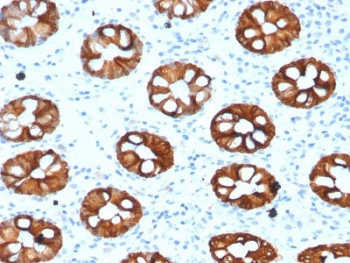- Tel: 858.663.9055
 Email: info@nsjbio.com
Email: info@nsjbio.com
- Tel: 858.663.9055
- Email: info@nsjbio.com
Cytokeratin 20 Antibody reagents target keratin 20 (KRT20), a type I intermediate filament protein expressed primarily in gastrointestinal epithelium, urothelium, and Merkel cells. KRT20 provides structural stability to epithelial cells and contributes to cytoskeletal organization, tissue integrity, and resilience under mechanical stress.
Because of its highly restricted expression profile, KRT20 is a widely used biomarker in pathology. It plays a central role in tumor classification, particularly when used alongside CK7. A CK7–/CK20+ profile often indicates colorectal carcinoma, while other expression patterns help distinguish gastric, pancreatic, or urothelial carcinomas. The Cytokeratin 20 Antibody is therefore indispensable for gastrointestinal biology, oncology, and diagnostic pathology. The CK20 Antibody also supports research in developmental biology, regenerative medicine, and translational research.
NSJ Bioreagents offers Cytokeratin 20 Antibodies validated for immunohistochemistry, immunofluorescence, western blotting, ELISA, and flow cytometry. Each Cytokeratin 20 Antibody undergoes rigorous testing to ensure specificity, reproducibility, and minimal background.
By selecting Cytokeratin 20 Antibodies from NSJ Bioreagents, researchers gain reagents optimized for clarity and consistency. Our antibodies provide strong epithelial staining in gastrointestinal tissues, reproducible detection in lysates, and dependable performance across platforms. Comprehensive datasheets, suggested controls, and validated protocols ensure confidence in reproducibility and diagnostic reliability.
The Cytokeratin 20 Antibody supports diverse scientific and clinical applications.
Cytokeratin 20 Antibodies highlight expression in intestinal epithelium and goblet cells.
The Cytokeratin 20 Antibody supports studies of epithelial differentiation and turnover in the gut.
CK20 Antibody reagents map cytokeratin distribution in gastrointestinal tissues.
Cytokeratin 20 Antibodies are central to classifying carcinomas of gastrointestinal and urothelial origin.
The Cytokeratin 20 Antibody supports immunohistochemical panels used in tumor subtyping.
CK20 Antibody reagents confirm colorectal carcinoma with high diagnostic value.
Cytokeratin 20 Antibodies detect overexpression patterns in gastric and pancreatic cancers.
The Cytokeratin 20 Antibody helps distinguish urothelial carcinoma from other epithelial tumors.
CK20 Antibody reagents support biomarker discovery and validation in oncology research.
Cytokeratin 20 Antibodies track epithelial lineage during gastrointestinal development.
The Cytokeratin 20 Antibody validates differentiation in organoid and stem cell models.
CK20 Antibody tools support regenerative medicine studies focused on epithelial tissues.
Cytokeratin 20 Antibodies identify CTCs of gastrointestinal origin in liquid biopsy assays.
The Cytokeratin 20 Antibody supports translational oncology research on metastasis.
CK20 Antibody reagents provide tools for monitoring disease progression.
Cytokeratin 20 Antibodies are applied in biomarker-driven clinical trials.
The Cytokeratin 20 Antibody contributes to patient stratification in precision medicine.
CK20 Antibody reagents provide reproducibility in diagnostics and translational workflows.
KRT20 serves as a tissue-specific biomarker for gastrointestinal and urothelial epithelia. The Cytokeratin 20 Antibody enables precise detection of this protein, while the CK20 Antibody extends its applications across diagnostics, oncology, and translational medicine.
In oncology, Cytokeratin 20 Antibodies help distinguish colorectal, gastric, and pancreatic cancers. In pathology, the Cytokeratin 20 Antibody confirms epithelial origin in complex cases, especially when paired with CK7. In developmental biology, CK20 Antibody reagents validate epithelial lineage in gastrointestinal tissues.
Clinically, KRT20 immunostaining is one of the most widely used diagnostic tools in gastrointestinal pathology. Cytokeratin 20 Antibodies ensure reproducibility, reliability, and diagnostic accuracy, bridging research with patient care.
Cytokeratin 20 is a highly specific epithelial biomarker with major roles in gastrointestinal biology and cancer diagnostics. The Cytokeratin 20 Antibody equips scientists and clinicians with validated reagents for detecting KRT20 in oncology, pathology, and developmental biology, while the CK20 Antibody provides complementary applications in translational medicine. By ensuring specificity and reproducibility, these antibodies remain indispensable for advancing epithelial research and improving diagnostic outcomes.

IHC testing of human colon with Cytokeratin 20 antibody (clone KRT20/1993, cat # V7323).
|
| ||

|